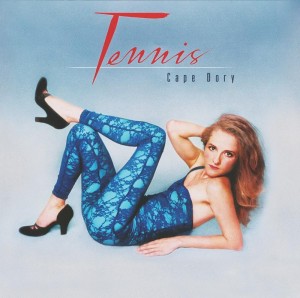
Alaina Moore poses seductively on the cover of Tennis’ lo-fi, ’60s-sounding debut album, “Cape Dory.”
Why a band whose debut album was inspired by a nautical adventure would call itself Tennis is an enigma to me. This puzzlement, however, doesn’t stand in the way of thoroughly enjoying Tennis’ first album, “Cape Dory,” which was released last month.
The masters behind this band are husband-and-wife-team Patrick Riley and Alaina Moore, who, in addition to being talented newcomers, appear to be time travelers. Their mellow, breezy pop reeks of the ’60s, while their album cover features Moore looking like something straight out of “Footloose.” Yet, on top of all of this, recent pictures of the young couple evoke today’s Williamsburg hipsters so well that I was surprised to learn the two actually hail from Denver, Colo., where they met at college.
Essentially, the couple and their music are the embodiment of timelessness. Perhaps to accommodate this, “Cape Dory” is available in vinyl, cassette, CD or MP3 format, depending on the decade with which you prefer to associate them.
Both Riley and Moore had musical experience prior to coming together as a band, but neither intended to have careers as musicians before their album.
The idea for “Cape Dory” came as the result of an 8-month sailing trip that the couple says strengthened their relationship and inspired their creativity and songwriting. They didn’t actually begin work on “Cape Dory,” however, until they had shed their sea legs.
The album title is the name of a type of sailboat similar to the 30-foot one on which the couple lived during their trip, and the track order reflects the trajectory of their Eastern Seaboard adventure. Titles such as “Bimini Bay,” “South Carolina” and “Baltimore” appear later in the album, while earlier songs contain lyrics reflecting the couple’s initial decision to take to the sea in the first place.
“Cape Dory” opens with “Take Me Somewhere,” which right away does take the listener somewhere: to the beach, circa 1962. With every line Moore sings and every chord Riley strums on the guitar, you can just imagine the women running around in their boy shorts bathing suits, and unaware of the risks of melanoma.
The lyrics also immediately allude to both the couples’ inspiration for the entire album, as well as the increased bond between them as a result of the journey, as Moore sings, “I get the tiller/you get the line.”
The end of “Cape Dory,” the album’s namesake song, features one of the only modern-sounding instrumental moments on the entire album, with a guitar riff that I wish lasted longer than 10 seconds as the track is fading out.
“South Carolina” is by far the best track and carries on a bit of what was begun in the last 10 seconds of “Cape Dory.” It has a bit of a faster pace than the rest of the tracks, and Moore’s voice sounds as though it is bouncing through the song, rather than dragging, as it does in some of the slower songs. “South Carolina” is also the song that kept getting stuck in my head and was ultimately what convinced me I actually liked this band.
Moore has a sort of crooning voice that sounds a bit distant and dreamy, and she holds this constant throughout the album, which I think is actually the duo’s biggest downfall. Her voice is unquestionably pleasant, and overall the album is very easy and enjoyable to listen to, but it lacks variety. In some sense, because it so accurately imitates the lo-fi ’60s sound, it also lacks originality. This makes me wonder if the band is capable of producing a successful second album — listeners don’t tend to stick with bands that can’t deliver anything new or interesting over a period of time.
To prove how much Tennis hit the nail on the head with the ’60s sound, I will relay a funny little anecdote. While listening to this album on repeat to prepare myself to write the review, I continuously just typed the keyword “Tennis” into the iTunes search box, thinking all it would bring up would be the group’s album. I spent days listening to their album under the impression that Moore had surrendered her position as lead vocalist to her husband for one generous song, but I was glad for the presence of at least this one tune, as it was the album’s only spot of slight song diversity.
It wasn’t until I was writing this article, however, that I noticed what I thought was Riley getting a moment of vocals in was actually a song called “Anyone for Tennis” by Cream, a ’60s band that was part of the British invasion along with The Beatles.
It’s fine to take inspiration from the sounds of the ’60s — it was an exciting and revolutionary time for music — but perhaps this mishap on my part should speak for itself in that Tennis overstepped the boundary between inspiration and pure mimicry. I’m not sure that the band will go anywhere in the future, unless they can figure out how to take their pure musical talent and make it their own, but for a debut album there’s certainly nothing offensive about “Cape Dory.” I would especially recommend them to fans of Beach House and Vampire Weekend.
Sklar is a member of the class of 2014.




